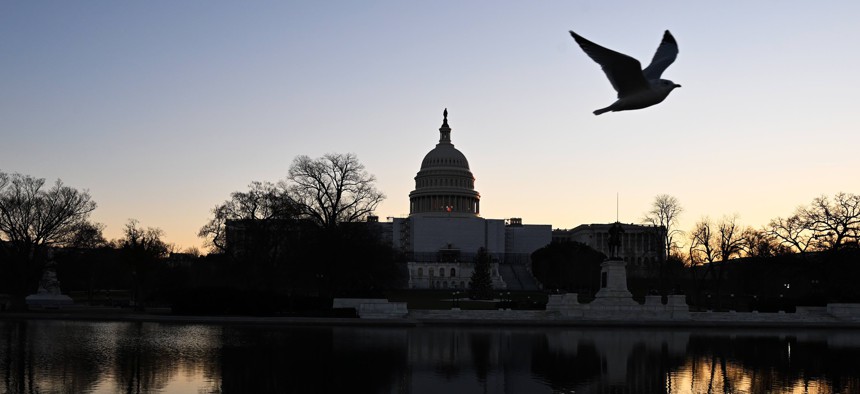Here's What Was Left Out of the $1.7 Trillion Federal Spending Bill

The United States Capitol is seen at sunrise on Monday December 19, 2022 in Washington, DC. Photo by Matt McClain/The Washington Post via Getty Images
A number of provisions state and local governments had been seeking were excluded, including renewed expansions of tax credit programs that help support low-income housing and households with kids.
U.S. Sen. Mike Lee, a Utah Republican, compared the proposed $1.7 trillion federal spending bill to a jar of Prego sauce—“because everything is in it.” But for state and local governments, a number of key provisions were left out, among them the restoration of expanded low-income housing tax credits and the renewal of a more generous child tax credit.
Both were blows to state and local governments. The increased housing tax credits had helped states build more affordable housing, and their expiration last year meant a loss of nearly $100 million worth of the credits for states in the midst of a national housing crisis.
Similarly, the failure to renew the now-expired child tax credit boost, which Congress made available last year under a pandemic aid package, was met with disappointment. Researchers say the credit was responsible for cutting in half the number of children living in poverty around the country.
Connecticut Democrat Rosa DeLauro, chair of the House Appropriations Committee, said she was “extremely disappointed” Democrats and Republicans were unable to reach agreement on the child tax credit in the “omnibus” spending package.
“I hoped our Republican colleagues would understand how important the child tax credit is to the financial stability of American families, but that has not come to pass,” DeLauro said in a statement to Route Fifty. “Families are falling behind and falling back into financial instability, and even poverty, after we allowed the child tax credit to lapse.”
Associations representing state and local governments are still working through the 4,155-page spending bill that Congress must pass by Friday to avoid a government shutdown. But among the other proposals that didn’t make it into the bill was an increase in how much in state and local taxes people can deduct from their federal taxes and a reform of federal marijuana laws that would allow state-regulated cannabis businesses to open bank accounts.
The $10,000 cap on the so-called SALT deduction, approved by Republicans in 2017, has made it harder for governments, particularly in high-tax states, to raise local taxes, the National Association of Counties and other state and local groups have argued. Residents are less likely to support new taxes, they say, because people can’t deduct as much of it from their federal tax bill. It's tough, however, to find data that can support these claims.
Local governments had also hoped lawmakers would embrace proposed changes that would have cleared a path for state-regulated marijuana companies to access banking services, instead of doing business primarily in cash. Without being able to open bank accounts, the businesses are targets for robberies, creating concerns for local officials about public safety, as well as tax evasion.
Democratic Senate Majority Leader Charles Schumer at a press conference expressed disappointment that Republican lawmakers opposed the marijuana banking reform.
“We had hoped to get it done,” Schumer told reporters, adding that Sen. Pat Toomey, a Pennsylvania Republican, and Republican Senate Minority Leader Mitch McConnell of Kentucky, had opposed it at the last minute. “We're going to go back at it next year.”
The fact that Democrats and Republicans were able to reach an agreement on a proposed bill raised hopes that Congress will pass a funding package by Friday to fund the government through Sept. 30. That would provide certainty for state and local governments, Mark Ritacco, chief government affairs officer for the National Association of Counties, said in an interview. The National Conference of State Legislatures agreed in a statement to Route Fifty.
Local and state government groups had worried that if the sides were unable to reach agreement, lawmakers would have had to pass a short-term spending deal. And with Republicans taking control of the House in January, those in state capitols and city halls were concerned negotiations next year could get bogged down in political disputes.
McConnell urged fellow Republicans to go along with the deal, saying it was a win for Republicans after Democrats agreed to $772.5 billion for non-defense discretionary programs, less than the $858 billion in the measure for defense.
Still, some conservative Republicans in the Senate and the House have opposed passing the omnibus bill this week, arguing that they should wait until January when they will control the House and have more leverage to push for even less spending.
Despite the exclusion of the low-income housing tax credit provisions from the bill, Sen. Brian Schatz, a Hawaii Democrat and chairman of the Appropriations Subcommittee on Transportation, Housing And Urban Development, said there were housing gains in the omnibus. Additional funding in the bill, he said in a press release, “directly addresses America’s housing crisis.”
Kery Murakami is a senior reporter for Route Fifty.
NEXT STORY: Real-Time Data on What Muni Bond Investors Think of Your City






